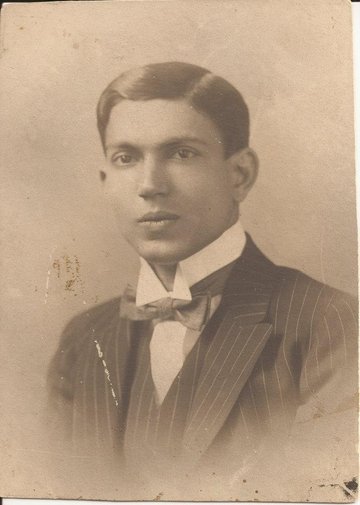
M. Asaf Ali
‐
Lawyer, politician and activist for Indian independence
Other names
Mohammad Asaf Ali
Date of arrival to Britain
Location(s)
Highgate
N6 5HH
United Kingdom Finsbury Park
N7 6RU
United Kingdom
Place of death
Berne, Switzerland
Date of time spent in Britain
May 1909 – January 1912, 1914
About
Born in 1888, Asaf Ali was educated at St Stephen's College, Delhi and then went to London to study law in 1909. Asaf Ali was a frequent visitor to India House in Highgate, having been met by a resident at Charing Cross. He became close friends with Virendranath Chattopadhyaya (Chatto) and met Madame Cama in Paris. After living at India House for a couple of weeks, he then moved to lodgings in Finsbury Park and studied for the Bar at Lincoln's Inn. Just as Jawaharlal Nehru remembers that he did not visit India House during his time as a student, Asaf Ali recalls that he did not meet Nehru when he was studying for the Bar, although they were in London at the same time. Asaf Ali was in London when Syed Ameer Ali founded the London Muslim League and attended the Universal Races Congress in London in 1911. He was called to the Bar in January 1912 and returned to India to practise.
In 1914 Asaf Ali returned to England on a Privy Council Brief. Upon his return he met up with old friends and began to frequent the National Liberal Club. He planned the publication of an Urdu literary magazine called Taj from London but the costs were beyond his means. He translated some of Rabindranath Tagore's poems into Urdu and was then introduced to Tagore at a reception at the Criterion organized by Indian residents in London. Having been friends with Chatto, he was introduced to Sarojini Naidu, his sister, and decided to organize a literary dinner for Naidu. He invited a whole host of famous British literary figures and asked W. B. Yeats to chair and propose the toasts. Ali and Naidu would often visit the Poetry Bookshop, where Harold Monro organized readings.
In 1914 the British attack on the Ottoman Empire had a large effect on the Indian Muslim community. Asaf Ali supported the Turkish side and resigned from the Privy Council. He saw this as an act of non-cooperation and returned to India in December 1914. Upon his return to India, Asaf Ali became heavily involved in the nationalist movement. He was elected to the Central Legislative Assembly in 1935 as a member of the Muslim Nationalist Party but then became a prominent member of Congress and was chosen as deputy leader. He was imprisoned in Ahmadnagar in 1944. His wife, Aruna, whom he married in 1928 and was of Hindu background, was a prominent Congress nationalist and socialist.
In 1947 Asaf Ali was appointed Ambassador to the United States; he was Governor of Orissa from 1948 to 1952 and was then India's Minister to Switzerland, Austria and the Vatican. He died in 1953 in Switzerland.
Aruna Asaf Ali (wife), Robert Bridges, Madame Cama, Mrinalini Chattopadhyaya (Sarojini Naidu's younger sister), Virendranath Chattopadhyaya, M. K. Gandhi (through Congress), Edmund Gosse, Syud Hossain, Mohammed Ali Jinnah (met at National Liberal Club), Walter de la Mare, Alice Meynell, Harold Monro, Sarojini Naidu, Henry Newbolt, Rabindranath Tagore, William Butler Yeats.
Constructive Non-Cooperation (Madras: Ganesh & Co., 1921)
Raghavan, G., M. Asaf Ali's Memoirs: The Emergence of Modern India (Delhi: Ajanta, 1994)
Image credit
Asaf Ali, c.1909, Switzerland
User:Amjadk04, Public domain, via Wikimedia Commons, https://commons.wikimedia.org/wiki/File:Asaf_Ali_c-_1909_2013-08-09_16-24.jpg
